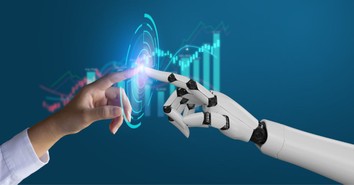How Should Christians Respond to Artificial Intelligence?

I often joke that because of the number of sci-fi movies about artificial intelligence out there, we’ve already seen how this story ends – with robots taking over the world. So why mess around with it?
Despite my half-hearted protests, AI seems like it is here to stay. AI is creeping up in every corner of our society – from copywriting programs to personalized shopping to autonomous vehicles. It seems like out of “nowhere,” AI is now everywhere.
AI is defined as “the ability of a system or a program to think and learn from experience.” Its modern usage is growing by the hour. Thirty-seven percent of organizations have implemented AI in one form or another. And supposedly, by 2025, 95 percent of customer interactions will be powered by AI.
With this technology becoming a part of our lives more and more each day, Christians may be wondering how they should respond to AI.
1. Pray for God’s Involvement in Its Implementation
God has worked through technology since the beginning of time. A campfire was once a new technology, and surely God has used fire to create warmth, ensure survival, and provide new opportunities for delicious meals and necessary nutrition. In more modern times, think of how God worked through Zoom and smartphones during COVID-19. Without technology, church meetings would have had to come to a screeching halt, and we would have been disconnected from our friends, family, and the body of Christ.
So, just because AI is a new technology doesn’t automatically mean it’s a bad one, and it doesn’t mean God can’t have us use it to accomplish his purposes.
However, among tech experts like Elon Musk, there does seem to be an attitude of wariness bordering on panic. He has been quoted saying that AI “has the potential of civilization destruction.”
I am no tech expert, and I can’t speak to the nuances of this potential. But it has my attention. And I believe that Christians have an opportunity to ask for God’s involvement in this new, potentially society-changing technology.
We can pray for its safe implementation, that it will bring goodness and not harm, and that those in power will be wise enough to put people over profit. We can also pray for our hearts to trust in God’s sovereignty if we are feeling fearful of AI’s societal implications.
2. Have Integrity with Its Use
My husband has joked that I should just use ChatGPT to write articles for Christian Headlines to save time. I didn’t believe in this possibility until he took a title of an article I was about to write and showed me what ChatGPT came up with. As I read this program's answer, my jaw dropped. Not only was ChatGPT’s “article” completely coherent, but it was also actually really decent … and made a point or two that I wouldn’t have thought to say.
Of course, ChatGPT, like all AI programs, can only learn what it is taught. So, it didn’t create any new ideas but rather wove together other human’s original ideas and combined them.
But it did so convincingly. And in certain situations or careers, maybe using ChatGPT or other AI services is actually best practice and encouraged to save time and thought. But be really clear about that before you use it so as to keep your integrity intact.
Don’t worry – I didn’t end up using ChatGPT to write that article or this one.
We should be wary of that temptation to cheat and go the easy route. Since I have the conviction that I am being paid for my thoughts and effort, using AI would feel like stealing someone else’s. But it’s possible that for you and your job, using AI could be beneficial.
Decide for yourself if using AI is in line with your integrity or not. And if it is in line, use it for good.
3. Continue to Connect to People
One of the most alarming uses of AI that I have heard of is dating apps. Not apps to connect you to other humans … But AI services that literally serve as a romantic partner.
The emotional, spiritual, and sexual implications of programs like this scare me. The amount of disconnection this world already experiences is bad enough without the temptation to give up on humans altogether and just get those needs “met” by robots.
So as a Christian, take Jesus’ command from John 15:12 to heart: “My command is this: Love each other as I have loved you.”
Be aware that the people around you are possibly very lonely. The pandemic, smartphones, TikTok, and American individualization are just a couple of the factors we are facing today that make us the loneliest generation to walk the earth. And Satan could use the very godly need to connect to attach humans to machines rather than humans to other humans.
Christians can mitigate this loneliness by simply going out of their way and being generous with what they have. Make eye contact with your coworkers and ask how they’re doing. Invite your neighbor over for a meal. Smile at people when you walk down the street. All of these small acts of kindness can create a connection in a world that desperately – and increasingly – needs it.
I’m sure that this article is not exhaustive, and we have only begun to understand the implications of this new technology. But as Romans 8:28 tells us, God can use everything for good. Let’s be on the frontlines of making sure that AI is being used for God’s purposes and not Satan’s.
The views expressed in this commentaries do not necessarily reflect those of Christian Headlines.
Photo courtesy: ©Getty Images/Userba011d64_201
The views expressed in this commentary do not necessarily reflect those of CrosswalkHeadlines.
Kelly-Jayne McGlynn is a former editor at Crosswalk.com. She sees the act of expression, whether through writing or art, as a way to co-create with God and experience him deeper. Check out her handmade earrings on Instagram and her website for more of her thoughts on connecting with God through creative endeavors.
Originally published July 12, 2023.







